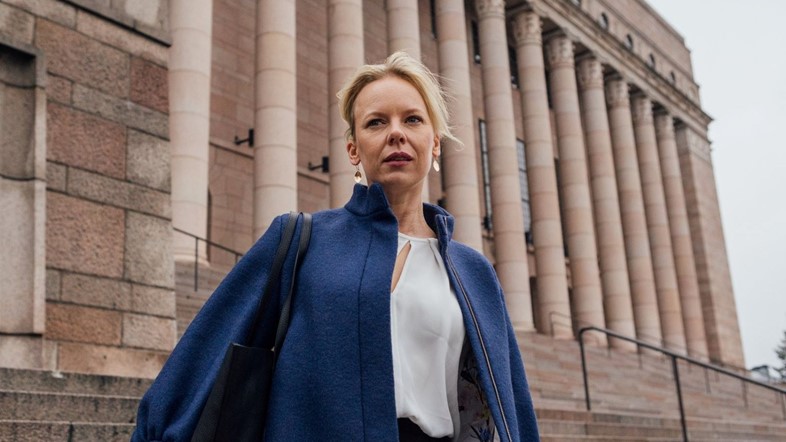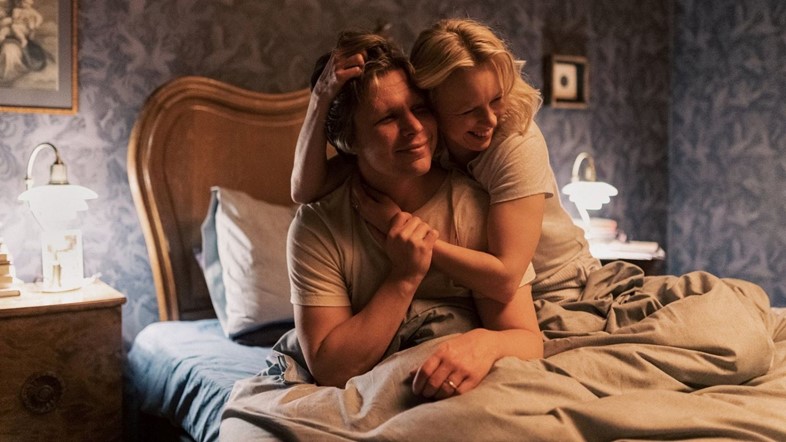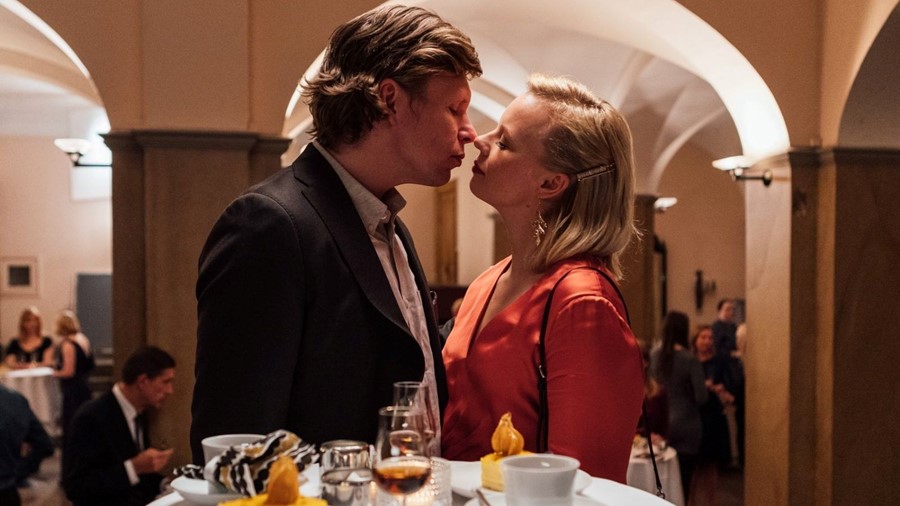As Four Little Adults is released in UK cinemas, Selma Vilhunen talks about her tender, Helsinki-set drama about ethical non-monogamy
For the past century, cinema has been an art form obsessed with romance, sex and fantasies many might wish to fulfil in their actual lives. It’s strange, then, how few films have tackled polyamory. Not comedies with open relationships as punchlines, but adult dramas about adults. In her new film, Oscar-nominated Finnish filmmaker Selma Vilhunen tells the story of a quartet experimenting with ethical non-monogamy. “I’ve been interested in the subject for as long as I’ve been in relationships,” says the 47-year-old director from her home in Finland. “For more than 20 years I’ve had questions around this one certain box of monogamy – the ‘only’ way to approach relationships.”
In Four Little Adults, a tender, poignant dramedy set in Helsinki, the characters don’t start off polyamorous. Not ethically, anyway. Juulia (Fallen Leaves’ Alma Pöysti) and Matias (Eero Milonoff from Border) are a seemingly content married couple with a rich sex life and a kid. To highlight their middle-class credentials, she’s a high-profile politician and he’s a respected parish priest; their days involve dinner parties, red wine and, presumably, shopping at the Finnish equivalent of Waitrose. It falls apart, though, when Juulia learns that Matias has been secretly sleeping with Enni (Oona Airola) for more than a year, to which the heartbroken woman proposes an alternative to divorce: Matias will continue dating Enni on the side, while Juulia will explore her own options. While presenting what could go wrong, the film also shrewdly asks what might actually go right.
“I’m constantly looking for a cinematic shape to portray love, and there’s something about polyamory that I find extremely beautiful,” says Vilhunen, who also wrote the script. “It’s wanting the other person to be free, and to fulfil their desires to such an extent that they’re free to have other relationships, and that doesn’t threaten the first relationship. To me, that’s the essence of what love is.” She refers to an M Scott Peck quote she read in bell hooks’ All About Love, about broadening yourself by allowing another person to nourish your growth. “When ethical non-monogamy is functioning in a good way, that is what’s happening.”
When I ask for a definition of ‘ethical’ non-monogamy, Vilhunen clarifies, “Nothing in life is ever 100% ethical or not ethical. It’s an aspiration. It’s something we strive for. Individual people are always flawed, and the thing is to somehow accept the messiness and chaotic nature of life. I don’t think that polyamory is less or more ethical than monogamy. A monogamous relationship can also be unethical in many ways.”

Four Little Adults, though, is also a deeply sad film that doesn’t shy from cruel realities. While Juulia takes pleasure from hooking up with who’s essentially the fourth little adult, she knows deep down that polyamory wasn’t a personal choice – just a response to unearthing her husband’s affair. Further complications arrive, too, when Enni reveals she’s pregnant with Matias’s child, prompting the possibility that the priest might have to raise two families – or choose one to prioritise. In Vilhunen’s unhurried script, the various ‘what if?’ scenarios are presented with pathos and painful believability; when elder relatives learn of the open marriage, their conservative outrage is heart-wrenching and inevitable.
“While this is a fictitious story, the emotions are personal,” says Vilhunen. “I wanted to write about polyamory from the common person’s point of view – from someone who’s new to it. It starts from a situation where someone already is non-monogamous, except he’s not ethically non-monogamous. People have always had lovers, mistresses and so on. I wanted to start from there.” When she refers to the ‘common person’, does she mean she’s satirising white bourgeois couples? “I was questioning my casting choices in that sense. I was very aware of the cast being super-white, and that some roles could have been less white. But I truly fell in love with these actors, and that’s what happened. It was a deliberate choice that the characters are very middle-class. I wanted them to be in a position of power, but at the same time [feel] like they could be you or me.”
My takeaway, I admit, is that polyamory looks exhausting and financially demanding. You have to take the time and energy required for one partner but then multiply that by however many people you’re dating, if not more, in order to compensate for the overall situation. “You’re right,” says Vilhunen. “This type of polyamorous lifestyle requires resources, and these people have them. I feel like I could have gone into studying their privilege even more, now that we’re touching on the subject. But my main focus was on the internal struggles, and the heartbreak and joy of finding love.” In fact, a key influence was Ingmar Bergman; before the shoot, she rewatched Fanny & Alexander with her cast. “Bergman’s way of looking at relationships is inspiring. Also the level of something spiritual – we could call it God – was important to me.”

In Vilhunen’s previous films – not counting her 2013 short Do I Have to Take Care of Everything?, which was nominated for an Oscar – she’s dealt with young protagonists. In Four Little Adults, though, she avoids the kind of bedhopping, app-using youngsters you might see in Challengers. “I wanted to show fragilities,” she explains. “People become vulnerable in new ways when they get older.” Her hope is that viewers of all ages will reconsider their approach to love, even if that doesn’t involve non-monogamy. “I don’t think the film is just about polyamory. It’s about relationships, and the questions that arise when people are striving to get both security and freedom. People have told me it’s given them space to be different with their partner. Maybe it’s given them room and acceptance for emotions that have been puzzling them.”
However, Vilhunen acknowledges that some potential viewers have deliberately avoided the film due to the word ‘polyamory’. On message boards, she’s noticed vocal opposition to non-monogamy as a concept; plenty of people, she believes, don’t want to confront certain questions with their partner. “Even if they wanted to see the film by themselves, it might create problems at home, just the fact that they saw it.” Could curious couples congregate after screenings and form new partnerships? “I like that! I was thinking of making a sequel called Eight Little Adults where the polycule is expanding.”
Four Little Adults is out in UK cinemas now.
